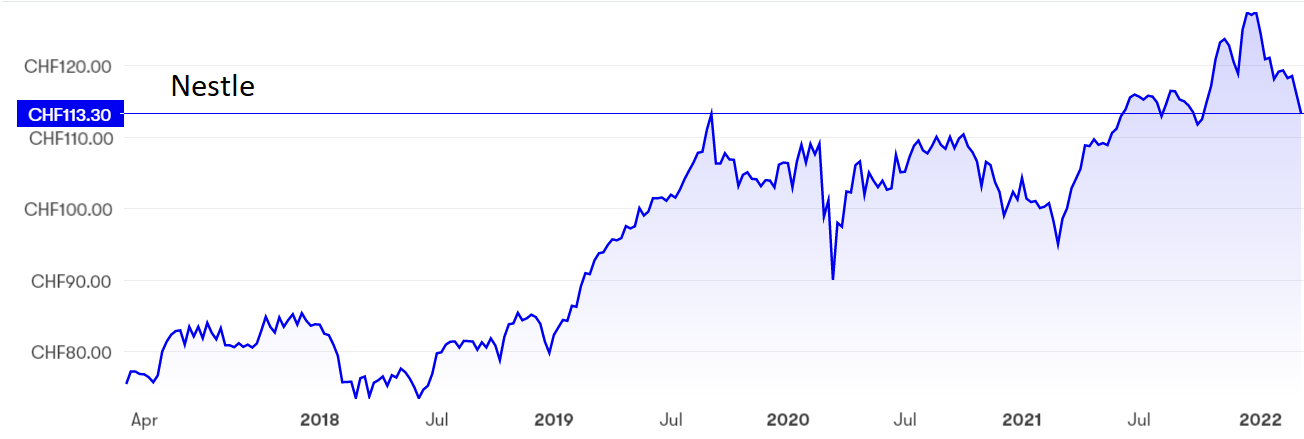A buying opportunity at the world's biggest food company
9th March 2022 08:48
by Rodney Hobson from interactive investor
Like many other stocks, the largest food company around is not immune from repercussions of the conflict in Ukraine, but this solid, profitable, well-run business is one to own, believes our overseas investing expert.

Having strong brands in troubled times is an attribute that investors do well to seek out. Few companies have stronger brands than Swiss multinational food and drink processing conglomerate Nestle (SIX:NESN), but that has not saved the shares from falling back in the general stock market turmoil. This could be a buying opportunity.
Nestle is the largest food company in the world and it consolidated its position last year with a strong sales rise, thanks largely to its coffee products which have been particularly in demand among office staff working from home during the pandemic.
Even those whose idea of escaping into the real world is seeking solace in Starbucks (NASDAQ:SBUX) outlets have contributed to Nestle, which bought the rights to sell Starbucks coffee and tea through grocery shops in 2018. That proved a timely move, coming little over a year before the pandemic struck.
- Commodities shock: wild times as scarcity looms
- Shares, funds and trusts for your ISA in 2022
- Could the S&P 500 really fall 20%?
- Want to buy and sell international shares? It’s easy to do. Here’s how
Pet food was also in demand as lonely housebound people separated from fellow humans sought alternative company. Likewise, health foods have been seen as an antidote to loneliness.
Total sales increased 3.3% to CHF84.34 billion, with organic sales 7.5% ahead, reflecting the strength of long established brands such as Kitkat and Nescafe, while net profits surged 38.2% to CHF16.9 billion. Sales and profits both beat expectations, with improvements coming across most categories and geographical areas.
For good measure, earnings per share enjoyed an additional boost from the CHF9.3 billion sale of 22.3 million shares in the French-based L'Oreal SA (EURONEXT:OR) beauty products business in December. That reduced Nestle’s stake from 23.3% to 20.1% and allowed it to take advantage of a doubling in the L’Oreal share price over the past five years and to pre-empt a 20% fall since.

Source: interactive investor. Past performance is not a guide to future performance.
Chief executive Mark Schneider admits that Nestle has felt “the impact of exceptional cost inflation” but claims with some justification that this has been well managed. Similarly, prices have been raised judiciously to increase sales revenue without choking off consumer demand.
The dividend of CHF2.80 is a welcome but very modest 1.8% increase from the previous year and represents the 27th consecutive annual rise.
Nestle expects annual organic sales growth to slow slightly to 5% this year, although the company has a history of making cautious forecasts at the start of the year to reduce the chances of having to disappoint shareholders with revised figures later. It looks as if consumers are still buying Nescafe instant coffee, Coffee-Mate creamer and Nespresso pods despite the gradual return to the office. Schneider reckons a flexible work-life pattern means many people will continue to work from home for at least part of the week.
- Bet on this stock in race for green energy
- Stockwatch: Russian aggression underwrites future for this sin stock
- Friends & Family: ii customers can give up to 5 people a free subscription to ii, for just £5 a month extra. Learn more
- Take control of your retirement planning with our award-winning, low-cost Self-Invested Personal Pension (SIPP)
Operating profit margins are estimated at 17-17.5%, pretty much the same as in 2021, although they will inevitably be squeezed by rising inflation as the year progresses. Companies in all sectors have to deal with strongly rising costs for raw materials, transport, energy and staff wages.
Nestle is confident it can pass on at least some of these costs through its own price rises without driving away customers, since rivals are equally affected. It stepped up price rises throughout 2021 to reach 3.1% by the fourth quarter.
The company will be affected by the war in Ukraine, although that is not a major impact. Nestle has three factories there with about 5,000 employees. It closed its operations temporarily and although it has reopened them there will be some inevitable impact.
Nestle shares rose from around CHF75 in mid-2018 to a peak of CHF127 at Christmas but have been on the slide this year and now stand at around CHF113, where the yield is 2.43%.
Hobson’s choice: Although the slide may have further to run while the Ukrainian conflict continues to spook investors, the shares are a buy. This is a solid, profitable, well-run company.
Rodney Hobson is a freelance contributor and not a direct employee of interactive investor.
These articles are provided for information purposes only. Occasionally, an opinion about whether to buy or sell a specific investment may be provided by third parties. The content is not intended to be a personal recommendation to buy or sell any financial instrument or product, or to adopt any investment strategy as it is not provided based on an assessment of your investing knowledge and experience, your financial situation or your investment objectives. The value of your investments, and the income derived from them, may go down as well as up. You may not get back all the money that you invest. The investments referred to in this article may not be suitable for all investors, and if in doubt, an investor should seek advice from a qualified investment adviser.
Full performance can be found on the company or index summary page on the interactive investor website. Simply click on the company's or index name highlighted in the article.
Disclosure
We use a combination of fundamental and technical analysis in forming our view as to the valuation and prospects of an investment. Where relevant we have set out those particular matters we think are important in the above article, but further detail can be found here.
Please note that our article on this investment should not be considered to be a regular publication.
Details of all recommendations issued by ii during the previous 12-month period can be found here.
ii adheres to a strict code of conduct. Contributors may hold shares or have other interests in companies included in these portfolios, which could create a conflict of interests. Contributors intending to write about any financial instruments in which they have an interest are required to disclose such interest to ii and in the article itself. ii will at all times consider whether such interest impairs the objectivity of the recommendation.
In addition, individuals involved in the production of investment articles are subject to a personal account dealing restriction, which prevents them from placing a transaction in the specified instrument(s) for a period before and for five working days after such publication. This is to avoid personal interests conflicting with the interests of the recipients of those investment articles.